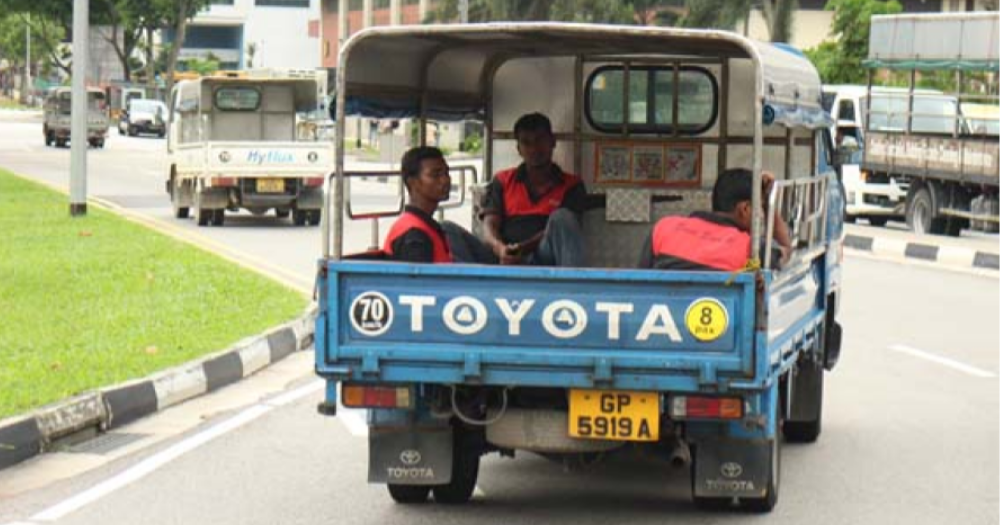Follow us on Telegram for the latest updates: https://t.me/mothershipsg
In the past three weeks, there have been three traffic accidents involving lorries that were carrying migrant workers. The accidents sent dozens of migrant workers to the hospital, and resulted in the death of two.
In Parliament on Monday (May 10), several Members of Parliament (MPs) raised questions to the Ministry of Transport (MOT) about the prevalence of accidents involving migrant workers being transported in lorries.
They also asked whether the ministry would consider reviewing the safety regulations to introduce more measures to protect the safety of migrant workers.
Significant practical & operational issues on top of cost considerations
Responding to the questions, Senior Minister of State for Transport Amy Khor said that the ministry is "deeply saddened" by the three accidents, and assured the MPs that the government "take[s] seriously the safety and well-being of all workers, including our foreign workers, without whose contributions, Singapore would not be what it is today".
She acknowledged that from the perspective of road safety, it would be "ideal" for lorries to not carry any passengers in their rear decks.
However, she said, "There are very significant practical and operational issues — on top of just cost considerations — which is probably why internationally, it is not an uncommon practice." Countries such as Canada, Thailand, and the U.S. allow for passengers to be ferried in the rear deck of goods vehicle, "albeit with safety precautions and some restrictions".
A workgroup that was co-chaired by the Ministry of Manpower and the Land Transport Authority in 2008 conducted a thorough review on the safety of workers being transported on lorries.
It found that companies — small and medium enterprises in the construction industry in particular — strongly urged the government to let them continue ferrying workers in lorries.
"The industry associations also provided strong feedback that switching to dedicated bus transport would lead to significantly higher business costs."
Khor added that other "practical challenges" were also highlighted, such as the inability for buses to have a dual use for transporting workers and equipment, which would result in "significant productivity loss".
Implemented enhanced safety measures in 2009 and 2010
To balance worker safety and the companies' concerns, the government implemented enhanced safety measures for lorries ferrying passengers in 2009 and 2010, such as lowering the maximum height of seated workers and mandating that lorries carrying passengers be fitted with canopies and higher side railings.
Back then, the workgroup already considered some of the suggestions raised by MPs in the present-day, such as installing seatbelts in the rear decks of lorries.
However, it found that doing so could result in other safety risks, because commercially-available lorries are not designed for seatbelts to be installed in the rear deck, and the floorboards might not be sufficiently strong to keep the seatbelts anchored in the event of an accident.
According to the LTA, the government originally planned to require employers to provide double the minimum deck space required per seated worker, to reduce the number of workers that can be transported on lorries.
However, after feedback from employers, LTA announced in a press release on Jul. 25, 2011 that it decided that it would not be implementing that requirement.
Regulatory changes now will hurt industry because of Covid-19
Khor said that over the past decade, the ministry continued to review and refine regulations.
For example, since 2015, all S-Pass and Work Permit Holders have been required to pass the necessary theory and practical driving tests before they can obtain a Singapore Class 3 licence that will allow them to drive light goods vehicles, including those which transport workers in the rear decks.
Khor said that making regulatory changes now, compared to 10 years ago, will harm the industry even more, given how severely it has been impacted by Covid-19.
"Worker supply has been disrupted leading to severe manpower shortages, projects are already delayed, and productivity has been affected because of safe management measures," she stated.
Further regulations will likely impact the completion of projects like BTOs, MRTs and hospitals, cause companies to shutter and end workers' livelihoods, said Khor, adding that such considerations cannot be ignored.
Number of injuries & fatalities of lorry passengers has decreased, but one life lost is one too many
Khor stated that over the past decade, the number of people onboard lorries who were injured in road traffic accidents has been on a downward trend.
"In 2019, the injury rate of persons onboard lorries is about 8.1 per 1,000 lorries, which is lower than the injury rate of persons on-board all motor vehicles at 8.4 per 1,000 motor vehicles.
In 2020, traffic volumes were lower due to Covid-19 restrictions, and the injury rate of persons on-board lorries was about 4.5 per 1,000 lorries, compared to 5.6 persons onboard all motor vehicles per 1,000 motor vehicles."
She added that the number of people onboard lorries who were killed in road traffic accidents has also been decreasing:
"From 2011 to 2015, an average of nine persons onboard per year were killed in road traffic accidents. This dropped to 2.6 per year from 2016 to 2020, or 2.5 if we exclude 2020."
However, she added, "Declining injuries and fatalities from such accidents should not make us complacent. One life lost is still one too many." She appealed to all road users to drive safely and responsibly.
Related stories:
Top photos via TWC2 and ItsRainingRaincoats video.
If you like what you read, follow us on Facebook, Instagram, Twitter and Telegram to get the latest updates.
